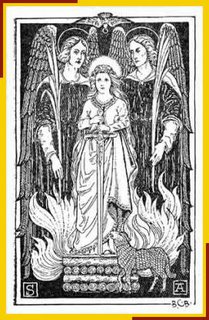Ante Diem XI Kalendas Februarias

Modern Date : January 22nd
Ante Diem XI Kalendas Februarias
Eleventh Day to the Kalends of February
This is one of the dies comitiales when committees of citizens could vote on political or criminal matters.
Columella says of this day, "The Lyre sets in the evening: it is a rainy day."
This is the birthday of Sir Francis Bacon (1561-1526).
This month is sacred to Janus, the god of Beginnings. Janus is the porter of heaven and considered the guardian deity of gates and doors. He is often shown as two-headed since doors face both ways.
Day of Apollo
In the ancient Greek and Roman calendars, this is the feast day of Apollo, god of the Sun, and also of light, intellect, classical beauty, prophecy and the lyre. Thousands of years ago, before the day of the Sun's entry into Aquarius moved to where it is now, on Jan. 19, this day marked the Sun's transition from the darkness and heaviness of Capricorn to the light and activity of Aquarius, the month in which the annual mid-winter festival of early February celebrated the passing of the Great Cold and the approach of the new Spring.
Apollo's day was later Christianized as the feast of St. Vincent, a shadowy figure who may not have lived, but who was likely invented, as his name means Wine in the Romance languages. St. Vincent is the patron of vintners and of those who just like to drink wine. The placement of his day is perfect, as it falls right at the top of the month when the Sun is in Aquarius, the sign which rules the 11th house of Friendship, and thereby favors all happy activities in which friends engage. St. Vincent's Day is also a major weather marker in Europe, for it was, and still is, said that fair weather on this day heralds an abundant grape harvest and a good vintage:
"Take care on St. Vincent's Day,
For if on this day you see
That the sun is bright and clear,
We'll have more wine than water."
Finally, on this day Mercury enters Aquarius, where he is said to be "exalted," and all Mercury-related activities are favored until 2/9, when Mercury is "in detriment" in Pisces. The implications are clear enough: schedule the master mind meetings, talk up whatever needs to get pitched, and write it up now, when the words flow like champagne.
St. Vincent
St. Vincent is a one of a number of Christianized forms of Apollo. St. Vincent’s day is important to the wine industry as he is considered the Patron Saint of wine growers. According to grape lore, if the weather is good on this day, the crops will be good this year.
It is said, "If the weather is fine, you'll enjoy the wine!" and...
“If that the sun his beams display,
Be sure to mark his transient beam,
Which through the window sheds a gleam;
For 'tis a token bright and clear,
Of prosperous weather all the year.”
Sacrifice to the Kitchen God
A week before Chinese New Year, the head of the household makes a sacrifice to TsaoWang, the kitchen god. Only men participate in this ritual which is sometimes called Little New Year. In ancient times, an antelope was sacrificed, but by 1900, people were offering candies and sugar cakes for the god and pure water, grass and beans for his horse. The sweet foods encouraged him to say sweet things about the family (or, made his mouth so sticky he could not open it).
Now the usual practice is to smear honey on the picture of the kitchen god which hangs in the kitchen. Then the picture is taken down and burned, along with paper spirit money. On New Year's Eve, a new picture will be put up. Sometimes fireworks are set off and thus this day is sometimes called "Little New Year."
On this same day, people paste up little good wish poems called "spring couplets" on gates and doors. These are similar to the peach charms of the past (boards of peach wood painted with pictures of gate gods or charms and put on the sides of doors). The spring couplets are written by professional calligraphers, usually on red paper, and say things like "May there be a single universal peace, with true wealth and honor. May the spring colors of the Nine Heaves appear in profuse elegance."

